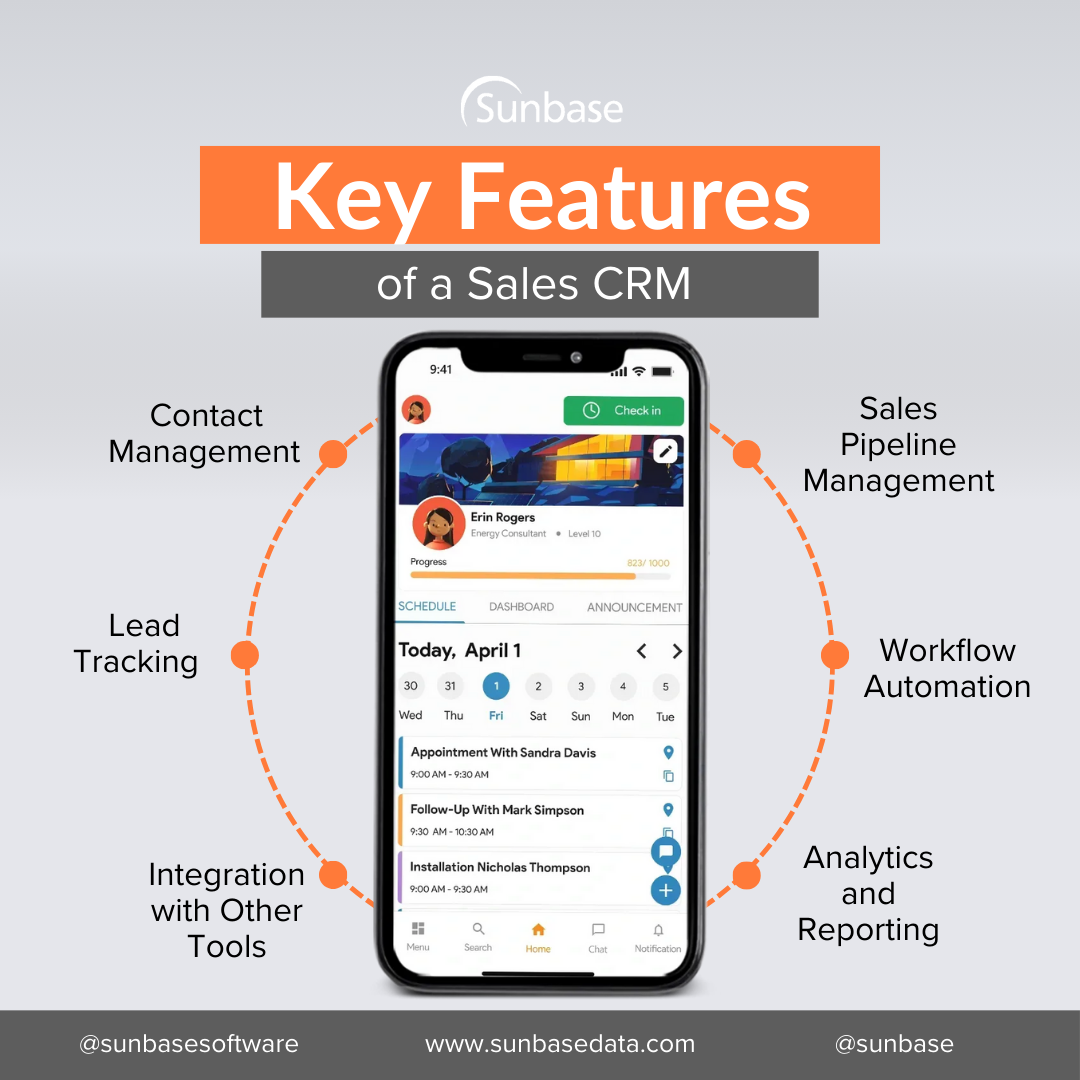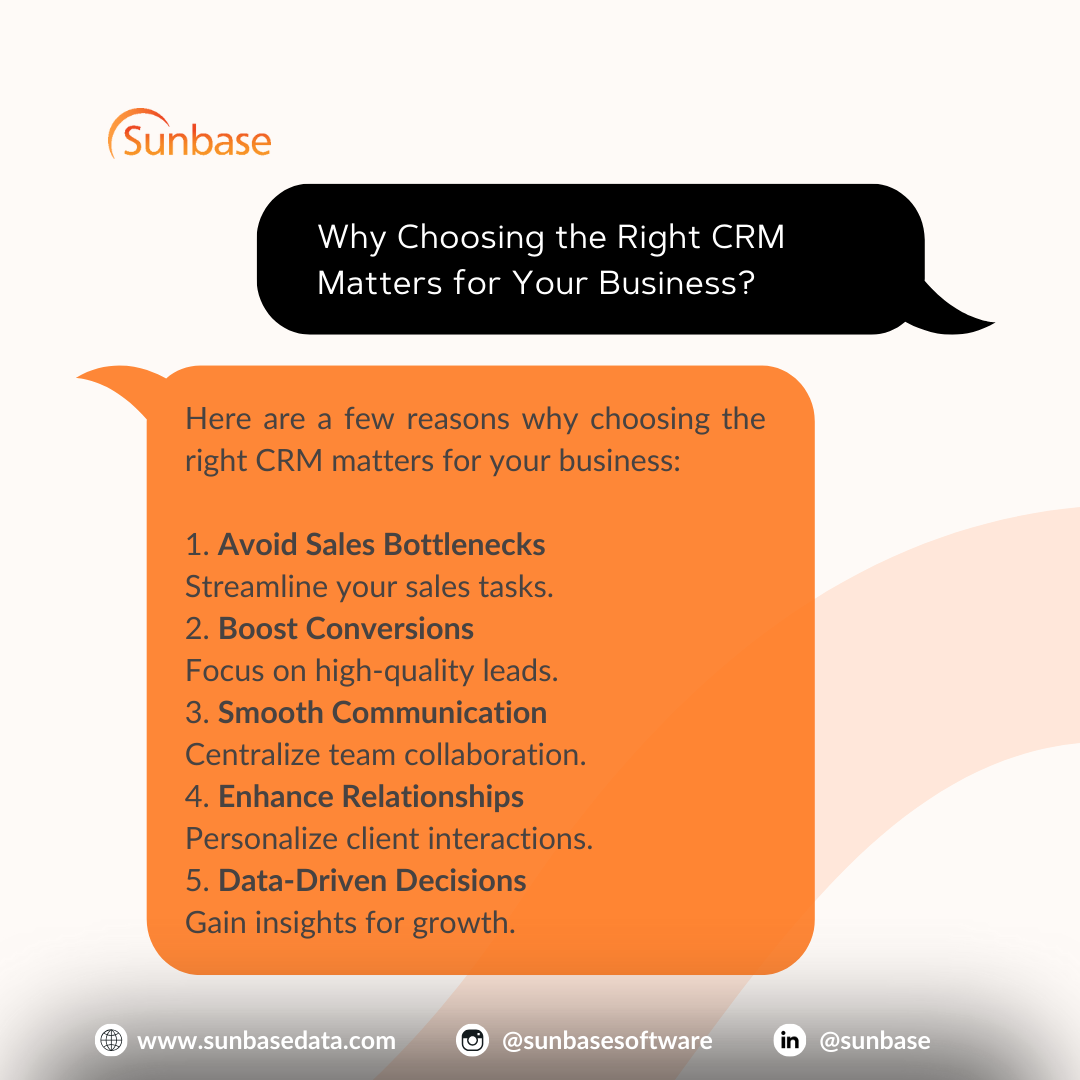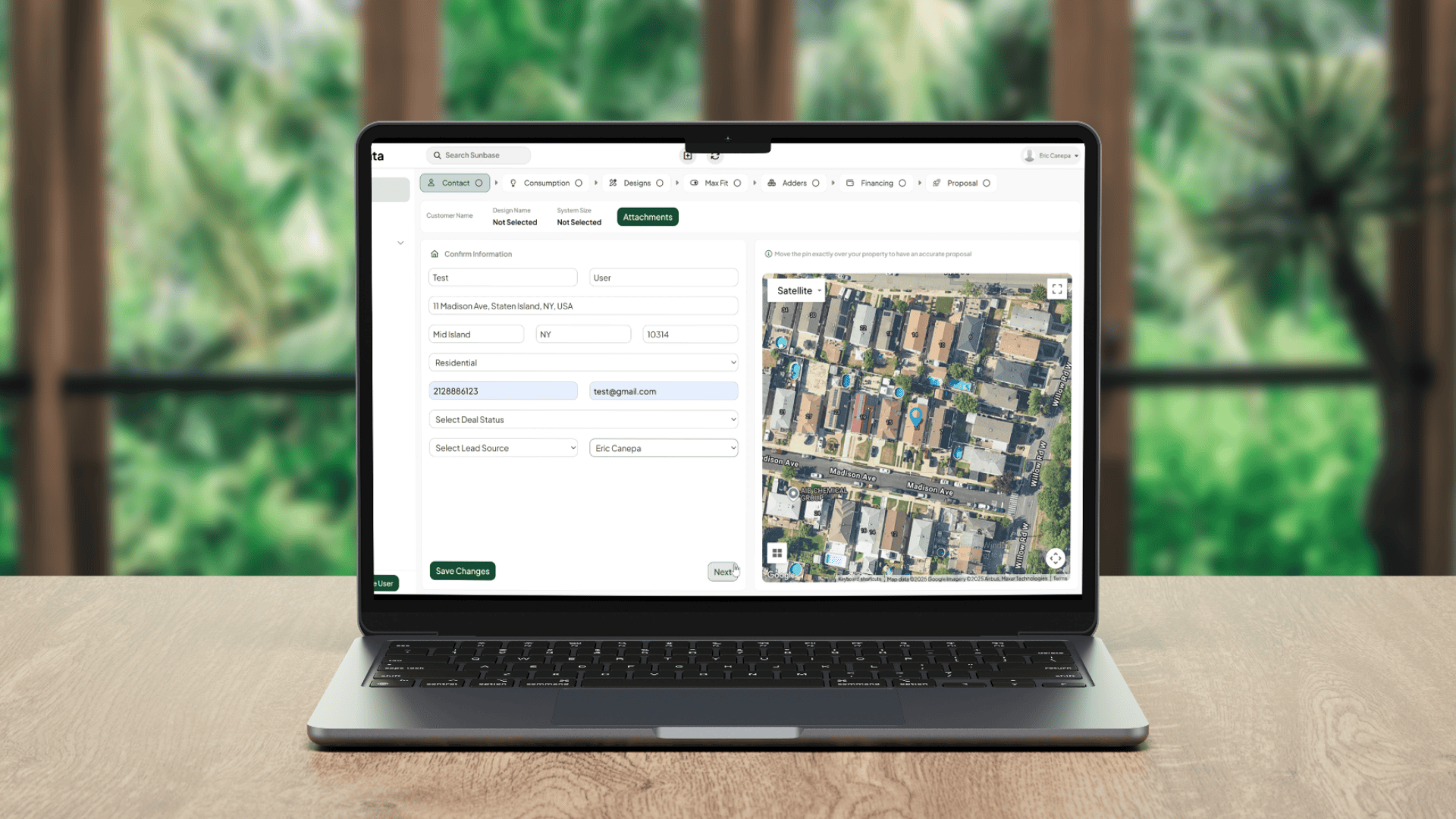May 1, 2023
CRM System For Sales
A CRM system is essential for streamlining sales operations by centralizing customer data, automating tasks, and improving team collaboration.
It helps manage leads, track sales pipelines, and nurture relationships, ultimately boosting customer satisfaction and driving revenue growth.
In industries like solar, construction, and field services, CRM systems optimize sales processes, ensuring efficiency and accuracy in complex workflows. By enabling better communication and insights, an effective CRM empowers sales teams to close deals faster and scale business operations seamlessly.
Key Features of a Sales CRM

1. Contact Management and Segmentation
A sales CRM should offer a centralized database that organizes leads and customers in one place, making it easier to manage and update information.
The ability to categorize leads based on demographics, industry, or purchase behavior allows for targeted sales strategies.
Customizable tags and fields enable tracking of specific client details, ensuring personalized communication and tailored offerings.
This feature ensures efficient lead management and helps sales teams focus on high-priority prospects for better results.
2. Sales Pipeline Management
A visual sales pipeline is a powerful tool in any CRM, offering an overview of deals at different stages.
Customizable stages ensure the pipeline matches your sales process. Sales reps can easily track opportunities and prioritize deals based on status.
Automated task assignment for follow-ups and reminders keeps the team on schedule, ensuring no opportunity falls through the cracks, ultimately streamlining sales operations and increasing closing rates.
3. Lead Tracking and Nurturing
Effective CRMs provide automated lead scoring to prioritize high-potential leads.
Lead capture from multiple sources, such as websites, phone calls, and emails, ensures no lead is missed. Integrated drip campaigns nurture prospects through automated emails tailored to specific customer journeys.
This enables continuous engagement with leads, increasing the chances of conversion and keeping the sales pipeline full. Nurturing leads becomes more systematic, reducing the chances of missing out on sales.
Sunbase Solar CRM offers an all-in-one solution for managing the sales funnel, tracking projects, and improving customer relationship management.
4. Workflow Automation
Workflow automation reduces repetitive tasks such as follow-ups, scheduling, and data entry, freeing up valuable time for sales reps to focus on selling.
Integration with tools like proposal generation or contract management simplifies the sales process. By automating routine tasks, you reduce manual errors and enhance productivity.
This streamlined approach increases operational efficiency, allowing sales teams to move through the sales cycle faster, ultimately leading to increased deal closures.
5. Integration with Marketing Tools
Sales CRM integrated with marketing automation platforms offer seamless collaboration between sales and marketing teams.
This allows for campaign tracking, lead generation from multiple sources (email, social media, ads), and efficient lead handover to the sales team.
Real-time data sharing ensures that marketing and sales are aligned, resulting in a smooth transition of leads through the funnel.
6. Analytics and Reporting
Comprehensive analytics and reporting features are essential for tracking sales performance in real-time.
Key performance indicators (KPIs) such as conversion rates, sales cycle length, and deal value can be measured. Customizable reports allow managers to assess both individual and team performance.
Predictive analytics help forecast future trends and prepare for potential challenges. These insights empower sales teams to make data-driven decisions, enhancing their strategy and improving overall performance.
7. Mobile Accessibility
Mobile accessibility is crucial for field sales teams, enabling them to access CRM data on the go.
With mobile CRM apps, reps can update deals, access customer info, and follow up on leads while in the field.
GPS tracking and location-based lead management are particularly beneficial for industries like construction and solar, where fieldwork is common.
This functionality ensures sales teams remain productive and connected, even outside the office, improving sales mobility.
8. Customization and Scalability
A Sales CRM software should be adaptable to industry-specific needs, offering customizable workflows, dashboards, and fields to fit your business processes, whether it's tracking solar projects or managing construction clients.
Scalability is equally important, allowing the system to grow as your sales team expands. Whether it's adding new users or adjusting features, a scalable CRM ensures long-term usability, supporting business growth and evolving sales requirements without disruptions.
CRM Features for Industry-Specific Sales Needs
| Industry | CRM features |
|---|---|
| Solar | Project-based CRM with proposal generation and site audit tracking. Offers accurate financial estimates and energy savings calculations to improve overall project efficiency. |
| Construction | Features include job costing, document management, and project timelines. Helps manage budgets, track milestones, and store essential documents in one centralized system. |
| Roofing/HVAC | Provides mobile functionality, inventory management, and service tracking. Teams can access real-time data, manage field tasks, and monitor materials for better efficiency. |
| General Contractors | Includes tools for scheduling, invoicing, and contract management. Streamlines client appointments ensures accurate billing, and tracks contractual obligations seamlessly. |
Sunbase – The Best All-in-One CRM

Sunbase’s CRM stands out as a comprehensive, all-in-one platform designed to streamline operations for various industries like solar, construction, roofing, and more. It offers everything you need to manage leads, create proposals, track projects, and analyze performance—all from a single platform.
The CRM is fully customizable, ensuring that businesses can tailor it to their specific processes, making it a versatile solution for managing diverse tasks efficiently.
Key Features:
- Lead Management: Organize, track, and nurture leads with automated tools to boost conversions and ensure no opportunity is missed.
- Proposal Generation: Create accurate, professional proposals with detailed designs, financing options, and e-signing capabilities, all tailored to industry-specific needs.
- Real-Time Reporting: Get instant insights into sales performance, project timelines, and customer interactions, enabling informed decision-making.
- Mobile Accessibility: Access the CRM on the go, allowing field teams to manage customer data, update projects, and track tasks in real-time.
- Inventory Control: Manage inventory levels with precision, ensuring timely project delivery and reducing delays
Why Choosing the Right CRM Matters for Your Business

Choosing the right CRM system is critical for any business looking to optimize its sales processes and enhance customer relationships. The right CRM not only streamlines operations but also boosts overall business performance by improving efficiency across teams.
1. Avoid Bottlenecks in Sales Processes
A well-implemented CRM prevents sales process delays by automating tasks, assigning follow-ups, and keeping deals moving through the pipeline. This helps sales teams stay organized and responsive to opportunities.
2. Improve Lead-to-Conversion Ratios
By providing tools for lead tracking, nurturing, and scoring, a CRM enables businesses to focus on high-quality leads, improving conversion rates. Automated follow-ups ensure no lead is missed, increasing sales potential.
3. Enable Smooth Communication Between Sales, Marketing, and Customer Service
CRMs centralize data and create a shared platform for sales, marketing, and support teams. This eliminates communication gaps, ensures seamless handoffs, and improves collaboration, resulting in a more cohesive customer experience.
4. Enhance Customer Relationship Management
With comprehensive customer profiles and interaction history, a CRM tool allows sales teams to personalize communication and provide better service, strengthening relationships and fostering long-term loyalty.
5. Data-Driven Insights for Decision Making
CRMs offer valuable insights through analytics and reporting, helping businesses track performance, forecast sales trends, and make informed decisions that drive growth. This enables teams to adjust strategies proactively based on real-time data.
Conclusion: Making the Right Choice
Choosing the right sales CRM is essential for streamlining contact management, lead nurturing, and workflow automation, while providing valuable analytics and mobile access.
A well-suited CRM boosts sales efficiency, improves customer relationships, and drives business growth. By aligning with industry-specific needs, our CRM solution ensures smooth operations and exceptional service across various industries.
About Us:
At Sunbase, we empower solar companies to stay competitive with our flexible CRM solution, which integrates seamlessly into your operations. Automating manual tasks and utilizing real-time data enhances efficiency and elevates the customer experience.
So, Let's Talk!
Ready to revolutionize your solar business? Schedule a demo with Sunbase today and discover how our innovative solutions can drive growth and success for your solar projects!
I agree to receive marketing messaging from Sunbase at the phone number provided above. I understand data rates will apply, and can reply STOP to OPT OUT.











